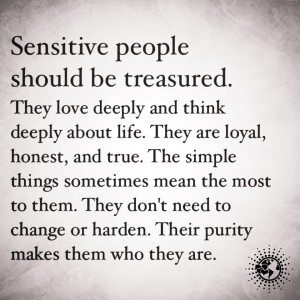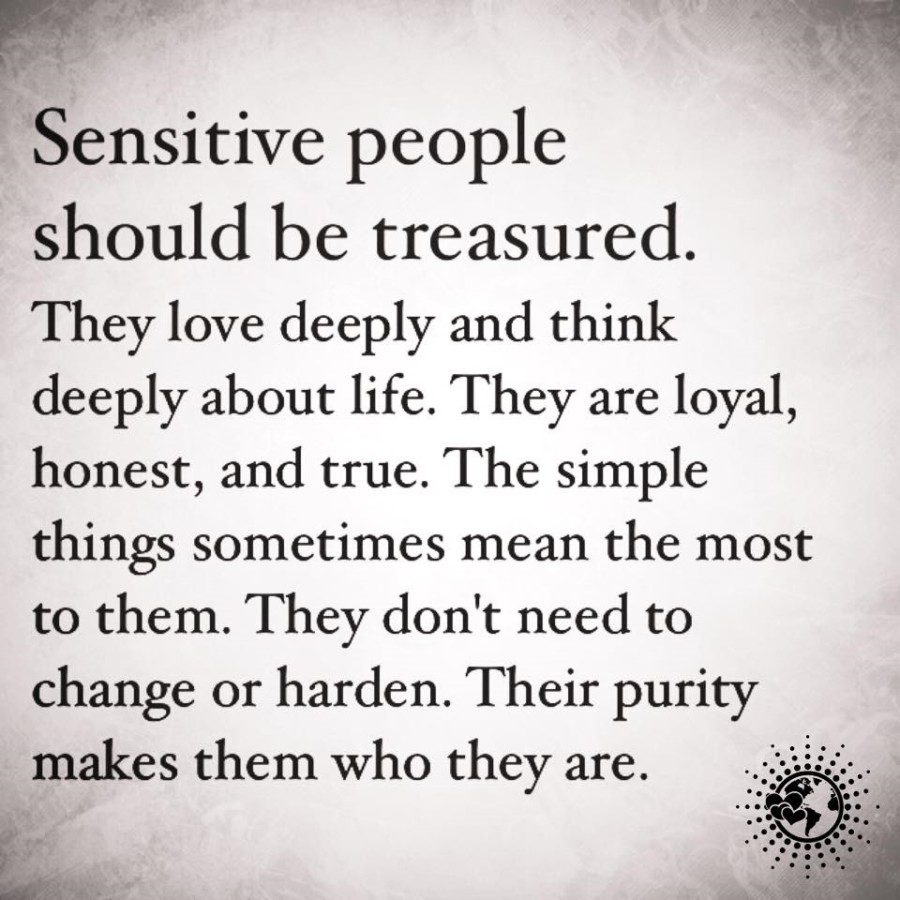Sometimes, sensitive people appear weak. They give in and they forgive with the same intensity that they love. They feel from the deepest part of their spirit. Besides that, they shed tears without shame, show vulnerability, and usually blame themselves for things that they feel in others.
In spite of being hurt, sensitive people still hold compassion in their hands, willing to give to everyone who needs. They share their knowledge in the simplest ways; through a kind word, a gentle touch, a listening ear, and an unconditional love that can’t be matched.
The sensitive person is able to detect a lie in minutes. And, yet, they will continue to show you profound humanness, empathy, kindness, grace, and devotion. They can smell fear, taste success, and hear those things that aren’t being said.
One thing is for sure – Sensitive people don’t care what you are or what you do – they feel the truth of who you are.
Sensitive souls are intuitive, insightful and believe wholeheartedly in their causes to help humanity.
The true beauty of a sensitive person is that they’ve endured such intense obstacles and challenges, and yet want to reach a hand out for others to transform and transcend from their own struggles.
The paradox of these lovely beings is that they have experienced deep pain, but they refuse to let it stop them from loving again. At the end of their lives, many sensitive people have lived fully through the wisdom of tenacity and persistence.
Sensitive people are the unique, beautiful souls that this world needs. They are the artists, creators, and inventors of our society. They are the originals who take chances, love without excuses, and change the world with one act of kindness at a time.
The world would be in total chaos if these beautiful souls weren’t here to balance the scales of negativity back to optimism.
What Causes Highly Sensitive People?
Being a highly sensitive person is a part of a personality trait that creates emotional sensitivity. Since many medical and psychiatric professionals don’t fully understand these sensitivities, these folks are often diagnosed with sensory processing or anxiety-based disorders. This sensitivity means that a person feels stronger stimulation when dealing with simple things like noise, light, or hunger pangs. It makes your inner life complex, and it can be challenging to manage.
It was psychologist Elaine Aron who came up with the theory of HPS, and her book detailing this personality issue has sold more than a million copies. Her vast knowledge of the mind’s innermost workings was based on self-identity. Today, it’s believed that about 20 percent of the population fits into the category of highly sensitive and being sensitive is a challenging but manageable condition.
Sensitivities Affect Everyday Life
At the crux of this matter is believed to be overwhelming feelings caused by chronic stress, tension, or violence. Folks with HSP are more apt to avoid situations where their sensitivities are profoundly manifested. For instance, if one is sensitive to lights, going to a bright outdoor event where the sun is beaming down might be complicated or even painful.
While there are overwhelming things about this condition, there are also positives to being highly sensitive. These folks are known to possess a significant level of creativity, and they tend to have more meaningful personal relationships. They appreciate things like the beauty of a flower growing in their yard or a child’s laughter.
Sadly, society doesn’t always understand the person with HSP. They often don’t have the correct emotional response when they’re in a social setting, and they can become uncomfortable when faced with trigger items. Perhaps their lack of comfort on the inside is what delves them into creative arenas like art and music.
You must weigh both the pros and cons of being a highly sensitive person, as managing this condition can be complex. A person with HSP requires proper support and the ability to recognize both strengths and shortcomings. Their home and workspace must be conducive to survival, and if something makes them uneasy, making exceptions to make their space comfortable is helpful.
7 Traits of Highly Sensitive People
Do you think you’re a highly sensitive person? Here are some common traits you can measure to see if you fit into this category.
1. They Have an Urge to Be Creative
The highly sensitive person must be creative as it’s a driving force in their personality. They find that they’re the happiest when creating music, drawing, painting, or letting their inner creative side flourish. They use this to balance all the energy they feel on the inside.
2. They Can Read People
Another fantastic thing about sensitive people is that they have an uncanny ability to read people. While they may miss some social cues, one thing they don’t miss is when someone is in pain. They tend to be empathetic as they know what it feels like to be out of sorts, so they pick up on this emotional turmoil with ease.
3. They’re Often Uncomfortable in Public
HSP may also have some social anxiety that accompanies their personality, especially since they often feel awkward when out of their comfort zone. For instance, if a person has a massive problem with noise, then going to a concert would only aggravate their situation. A psychologist might assume it’s an anxiety-based disorder when it’s a neurological nuance.
However, that’s not to say this person doesn’t have a secondary condition like anxiety that stems from their sensitivities. An article published by the National Library of Medicine states that people who have anxiety disorders are often sensitives, and those who have a sensitive personality often develop anxiety. So, while they’re two separate conditions, they’re most definitely linked.
4. They Can’t Stand Violent Movies
Since this person’s emotions are intense, they feel everything much deeper. So that movie meant just to frighten the audience might affect them for days afterward. They personalize things and feel the emotions of others. Watching violent movies can send them into emotional upheaval because they can’t shake the feeling as if it happened to them.
5. Their Feelings Are Easily Hurt
Sensitive people tend to wear their emotions on their sleeves. The smallest comment, even meant most constructively, can devastate this person. These folks will cry in an argument because their emotions become so overwhelmed, that they don’t know what to do or say, so they break down. They have no problem showing emotions as it seems to come naturally.
6. They’re Very Generous
One of the attractive traits of sensitive people is that they’re givers. These folks would give you the shirt off their back without question. They go out of their way to give their time to other people, but this also gets them in trouble. Some people will quickly take advantage of these folks and use them, as they see these individuals as doormats.
7. They Overanalyze and Overthink Each Situation
The HSP doesn’t like to make decisions as they tend to get caught up in all the little details and can’t focus on the big picture. They overanalyze everything until they drive themselves mad. Sensitive people will avoid making decisions and procrastinate until they call on others for help.
8. They Always Feel Different or Like They Don’t Belong
It’s not uncommon for HSP to feel like they don’t belong. During their school days, fitting in was a challenge that made them feel like outcasts. They might have formed deep bonds with some folks, but they always felt like the odd man out.
Final Thoughts on Highly Sensitive People
Sensitive people tend to feel things on a deeper level. It doesn’t matter if the situation is positive or negative, as it has an overwhelming effect on them. There are many highs and lows to managing this condition, as it’s quite overwhelming. It can profoundly affect relationships, stress levels, and everyday life.
If you think you’re an HSP, talk to a counselor and learn practical management tools to handle difficult situations. There’s no magic cure for this condition, but you can learn ways to manage it and have a happy life.


















